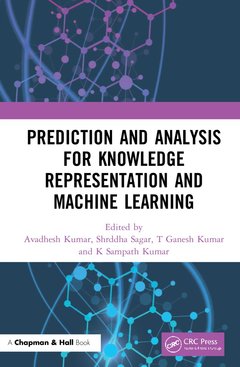Prediction and Analysis for Knowledge Representation and Machine Learning Prediction and Analysis for Knowledge Representation and Machine Learning
Coordonnateurs : Kumar Avadhesh, Sagar Shrddha, Kumar T Ganesh, Kumar K Sampath

A number of approaches are being defined for statistics and machine learning. These approaches are used for the identification of the process of the system and the models created from the system?s perceived data, assisting scientists in the generation or refinement of current models. Machine learning is being studied extensively in science, particularly in bioinformatics, economics, social sciences, ecology, and climate science, but learning from data individually needs to be researched more for complex scenarios. Advanced knowledge representation approaches that can capture structural and process properties are necessary to provide meaningful knowledge to machine learning algorithms. It has a significant impact on comprehending difficult scientific problems.
Prediction and Analysis for Knowledge Representation and Machine Learningdemonstrates various knowledge representation and machine learning methodologies and architectures that will be active in the research field. The approaches are reviewed with real-life examples from a wide range of research topics. An understanding of a number of techniques and algorithms that are implemented in knowledge representation in machine learning is available through the book?s website.
Features:
- Examines the representational adequacy of needed knowledge representation
- Manipulates inferential adequacy for knowledge representation in order to produce new knowledge derived from the original information
- Improves inferential and acquisition efficiency by applying automatic methods to acquire new knowledge
- Covers the major challenges, concerns, and breakthroughs in knowledge representation and machine learning using the most up-to-date technology
- Describes the ideas of knowledge representation and related technologies, as well as their applications, in order to help humankind become better and smarter
This book serves as a reference book for researchers and practitioners who are working in the field of information technology and computer science in knowledge representation and machine learning for both basic and advanced concepts. Nowadays, it has become essential to develop adaptive, robust, scalable, and reliable applications and also design solutions for day-to-day problems. The edited book will be helpful for industry people and will also help beginners as well as high-level users for learning the latest things, which include both basic and advanced concepts.
1. Machine Learning. 2. Design of a knowledge representation and Indexing: Background and Future. 3. Prediction Analysis of Noise Component using Median Based Filters Cascaded With Evolutionary Algorithms. 4. Construction of Deep Representations. 5. Knowledge Representation using Probabilistic model and Reconstruction based algorithms. 6. Multi-Ontology Mapping for Internet of Things (MOMI). 7. Higher Level Abstraction of Deep Architecture. 8. Knowledge Representation and Learning Mechanism Based on Networks of Spiking Neurons. 9. Multiview Representation learning. 10. Covid-19 Applications
Avadhesh Kumar is PVC at Galgotias University, Greater Noida, Uttar Pradesh, India. He has more than 21 years of Academic and Research Experience. He was awarded Ph.D. in Computer Science & Engineering in 2010 from Thapar University, Patiala, Punjab, India. He did his M.Tech. in Information Technology and B.Tech. in Computer Science & Engineering from Harcourt Butler Technological Institute (HBTI), Kanpur, UP, India. His Research Area includes Software Engineering, Aspect-Oriented Software Systems, Component-Based Software Development, Soft Computing, and Artificial Intelligence. He has published more than 30 Research papers in reputed Journals and conferences. He has authored 3 books. He is Reviewer of many International Journals and Conferences. He has been Keynote Speaker in many International Conferences.
Shrddha Sagar is working as Associate Professor in School of Computing Science and Engineering, Galgotias University, NCR Delhi, India. She has completed Ph. D in Computer Science from Banasthali University, Jaipur, India. Her main thrust research areas are Artificial Intelligence, Internet of Things, Machine learning and Big Data. She is a pioneer researcher in the areas of Artificial Intelligence, Internet of Things, Machine learning and has published more than 25 papers in various national / international journals. She has presented paper in National/International Conferences, published book chapters in Taylor & Francis Group (CRC Press), IGI global.
Dr. T. Ganesh Kumar works as an Associate Professor at the School of Computing Science and Engineering in Galgotias University, NCR, Delhi. He received ME degree in Computer Science and Engineering from Manonmaniam Sundaranar University, Tamilnadu, India. He completed his full time PhD degree in Computer Science and Engineering at Manonmaniam Sundaranar University. He was Co-Investigator for two government of India sponsored funded pr
Date de parution : 01-2022
15.6x23.4 cm
Thèmes de Prediction and Analysis for Knowledge Representation and... :
Mots-clés :
BFO Algorithm; Deep Learning Algorithm; Sparse CCA; Machine Learning Models; Unsupervised Feature Learning; ABC Optimization; Blockchain Technology; Big Data Analytics; Softmax Classifier; RBM; Discriminative Tasks; Weak Learners; Deep Belief Networks; Boltzmann Machines; Gradient Boosting; ABC Algorithm; MTL; Hidden Neurons; UGMs; SNN; Adaptive Boosting; Multitask Learning; STDP; Deep Learning; Ensemble Model



